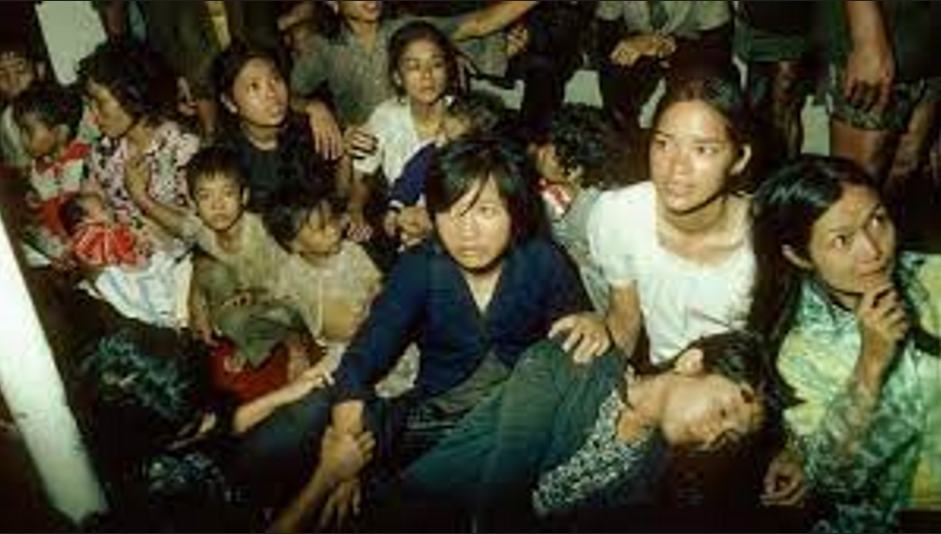People involved:
(Recording of Peter Dutton's statement on (immigrants) plays)
(Insert transcript here)
Host: Now, we are extremely grateful to have guest speaker Hải Minh Nguyễn. Being considered a 'boat person' himself, his bestseller "A soulless ocean" has brought to light the struggles that countless families bravely fought for a chance at a new life in Australia. Hải Minh, what do you think about Dutton's recent zero-tolerance policy of boat refugees?
Hải Minh: It's frankly outrageous. I find it difficult to believe that Australia, one of the strongest democracies in the free world, could implement such an unsympathetic, authoritarian border policy. I can still remember the journey I embarked on as my family left Vietnam. My family had owned a prosperous farm near Saigon, and had a comfortable life. However, when the North seized Saigon, they took everything away from us. The farm was confiscated by the state, and we had to share all of our hard-earned wealth and belongings with Northern soldiers, who treated us like slaves.
Host: That sounds horrible. Please continue.
Hải Minh: Well, my family saw no other option but to leave. There was no freedom for us in Vietnam, and we had a target on our back for supporting the South in the war. So we gathered as many valuables as we could find, and my father paid for our extended family to leave for Australia. I was only 10, so I can barely recall life in Vietnam, but I definitely can remember the journey. I shouldn't call it a journey, as it was more of a punishment. A punishment for leaving Vietnam, for leaving people behind. Any family I have left there are either dead or their whereabouts are unknown. The voyage was heartless, with the waves thundering like the artillery shells back at home. It was as if I had never left. I was still hurdled in a corner, desperately grabbing the floor in the hopes a big wave wouldn't send me overboard. The suffocating winds of salt was overcome by the smell of vomit. This was a struggle that everyone onboard endured, for months on end. Not everyone made it through. My grandmother would pass away a few kilometres from the shores of Australia.
Host: I'm deeply sorry for your loss.
Hải Minh: She was one of the lucky ones. She was buried in Australia. Those that died before here would be thrown into the sea. Their grave being the vast waterbed of the Pacific. Our family went through all this pain, suffering and torture, just to make it to Australia. To have a new life, one of personal and economic liberty. For them, the risk of dying a thousand kilometres away from home among the waves was worth it.
Host: And now Dutton's new policy has taken away this opportunity for anyone else.
Hải Minh: It's even worse than that. Dutton's so-called Operation Sovereign Borders completely fails to inform potential refugees that they will be denied. So all it does is send boats back. Without any sort of support, or protection. Sure, your family may have perished and you are unable to enter your home country without death looming, but the Australian government will still deny you access to the fabled land of freedom just a few meters away. There is no sense of morality in Dutton's policy. There is only arrogance, and insensitivity to the plight of refugees.
Host: How would you say this policy affects Australia's image worldwide.
Hải Minh: It's worrying, to be sure. When a first-world, free nation starts denying people with nowhere to go, one might question the humanitarian intent of the Australian government. Australia is a signatory to the UN Refugee Convention, so it's rather concerning when 47 member states called out the Australian Government's refugee policies, pointing out a non-robust and discriminatory approach to refugee arriving by boat.
Host: Do you think the UN has the right to condemn or enforce a more lenient refugee policy in Australia?
Hải Minh: Absolutely. Australia chose to ratify the Refugee Convention. They should understand and adhere to its clear, well-defined points. The lives of refugees should not be a political hammer for the ruling party to beat the opposite with.
Host: Agreed, these are families we're talking about. Families with nothing left anymore, who have no choice but to become refugees in the hopes of a better life. Now, take a look at this picture.
(Picture of refugees show)

Host: What do you think of this?
Hải Minh: It's an unfortunate reality we live in. None of these people want to be refugees. They just want to survive, and have the best opportunity at life. When we send back boats, we are denying refugees their basic human rights to freedom of movement. I am fortunate to have had many great moments in my life. But none were as joyous or rewarding when I got off the boat. Having made it through the thundering hell that is the Pacific, I could really appreciate the tranquillity and silence of Australia. The calm tides washing over my feet, it was as if I was reborn. My family had nothing to their name, so we had to work hard to survive. But we did. We did so with a smile on our face, because we knew the alternative was a cold, bitter life as workers under Vietnam's tyrannical government.
Host: So arriving at the shores of Australia liberated you from your loyalty to Vietnam.
Hải Minh: Exactly. At that moment, I became an Australian.